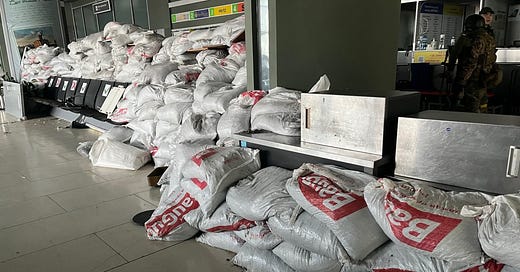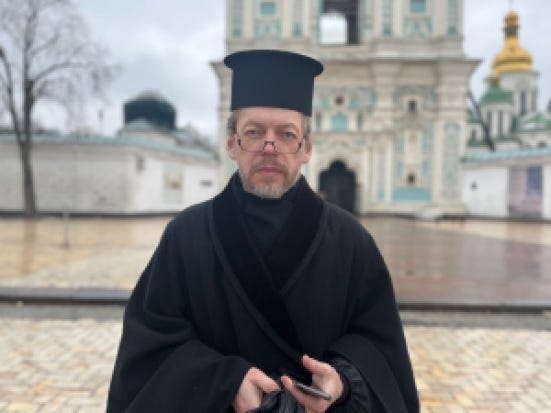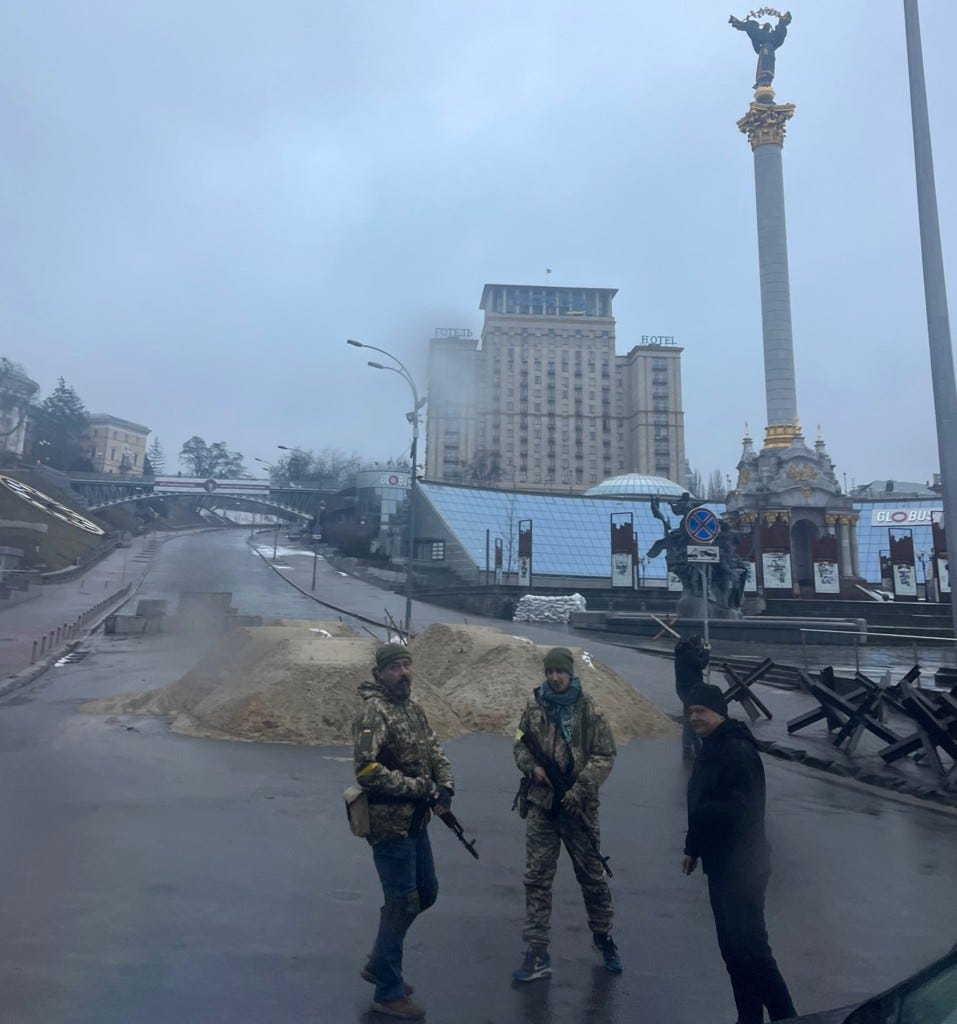DISPATCHES FROM UKRAINE: Kyiv’s Airport Frontline, Putin the “Antichrist,” Spotting Russian Saboteurs, Driving Across the Country, What Fleeing Mothers Tell Children, and Inside the Russian Mind
“I am fifty-one years old. I have children of my own. But I still want my mama.”
- Svetlana Alexievich, “Last Witnesses”
INSIDE UKRAINE’S DESPERATE FIGHT AGAINST RUSSIA AT KYIV AIRPORT
Distant artillery cracks across the gloomy sky at Kyiv Sikorsky International Airport, where hardened Ukrainian soldiers struggle to hold on to the besieged city’s vital link to the outside world.
The battle-ready men casually maneuver in small groups past bomb-blistered vehicles and shattered terminal entrance windows – cigarettes dangling from their lips and rifles clutched in their hands. For them, the clock is running out, and they are desperate for more Western support.
Just over a week ago, the airport was still considered one of the busiest aviation hubs in all of Europe, flying travelers in and out of a city on edge.
But since Russia launched a large-scale invasion of the country last Wednesday – the latest bloody chapter in the already simmering eight-year conflict – the installation has become a frontline in the fight against Russian troops.
“Of course, this is a big target; we have already had shelling. Getting this airport is key to capturing the city of Kyiv,” General Serhiy Kryvonos, former Deputy Secretary of Ukraine’s National Security and Defense Council (NSDC) Army, told The Post from a mortar-wracked entrance area.
“We need more anti-tank missile systems. If we are provided with aviation, we would be able to quickly destroy the many convoys surrounding Kyiv piece-by-piece.”
Kryvonos, who founded Ukraine’s Special Forces four years ago, said the much-anticipated Russian assault team has been lagging, as their fuel supplies are reaching exhaustion, and they are preparing to shore up logistics and equipment to keep going.
“It is not so much about destroying the tanks but destroying the fueling trucks. And Europe has to understand that if they don’t support us, they will be the next target,” Kryvonos said.
Despite the mounds of sandbags, the camouflage clothes left to dry in barren waiting areas, and trenches dug deep into the earth around the sprawling building, much of the critical infrastructure shows little sign of the battle going on.
CLICK TO READ MORE ABOUT THE FRONTLINE FIGHT
UKRAINIAN CHURCH LEADERS JOIN FIGHT AGAINST PUTIN’S INVASION: ‘HE IS THE ANTICHRIST
At the first hint of milky light cracking the darkness, the moment the wartime curfew imposed on the Ukrainian capital of Kyiv lifts, a small cluster of volunteer fighters – the baby-faced to the wrinkled – climb the cobblestone steps to the stone church above the city. Some stand guard near the wrought iron gates, and others idle by the arched wooden doorway of the shuttered Church of Michael Sanctifier, with its faded dark domes, their heads bowed.
This new phase of war may have sealed off their Houses of Worship, but it has only strengthened the resolve of Ukrainians to fight for their freedom, to hold on to their Motherland.
“We fight,” one young man, Artem, tells me in halting English, cradling a rifle as it were a small child. “For God, and with God.”
With wisps of blond hair falling across his wet eyes, he says his name means “unhurt.”
Ten days into the full-scale Russian invasion, with Russian troops steadily snaking around to besiege Kyiv days after President Vladimir Putin put nuclear defensives on high alert, Ukrainians no longer flinch at the sound of artillery shells roaring from afar. Instead, many turn to Church leaders for light in a dark time. And those incensed leaders are no longer prepared to kneel passively while their neighbors bleed for their homeland.
“Kyiv is a peaceful city, Ukraine is a peaceful country, and our nation is peaceful people. But we will defend our rights, our country. God is not where the strength is, but where the truth is,” Father George Kovalenko stresses from outside Kyiv’s storied St. Sophia Cathedral in the heart of the capital. “We pray to God to provide us with wisdom and strength to defend good against evil.”
In this period far from peace, the Church and faith play an even more pivotal role in everyday life. In addition to the air raid sirens, Church bells ring out as a warning to Ukrainians to shelter in bunkers. Houses of worship that remain open in safer pockets of the country offer sermons and first-aid training. Unfortunately, such houses have also become ad-hoc homes as thousands flee the capital and other hard-hit towns and villages. Given many can no longer visit their churches, they gather in bomb shelters and subway stations on Sunday mornings for makeshift mass.
The notion that neighbors are doing this to neighbors, brothers doing this to brothers, and Christians doing this to fellow Christians, has prompted long moments of reflection.
CLICK TO READ MORE ABOUT THE ROLE OF CHRISTIANITY IN THE WAR
UKRAINIAN CIVILIANS — INSPIRED BY ‘THE MATRIX’ — HUNT RUSSIAN ‘SABOTEURS’ IN KYIV
In this besieged city everyone has become Neo.
Ukrainian civilians are taking on the task of spotting Russian infiltrators and “saboteurs” on the barren streets of Kyiv — and are taking inspiration from American movies such as “The Matrix” as they personally hunt down the possible enemy agents.
“We have a lot of provocateurs in the city, and yesterday I had two of them arrested from the streets,” says Victoria Kramarenko, 55, a nurse and longtime volunteer medic.
Detecting saboteurs has become such a serious issue, and authorities are encouraging everyone to participate in a “see something, say something” campaign of the sort New York’s MTA started after the 9/11 terror attack.
Kramarenko says she first noticed suspicious characters lurking around town a couple of months ago, when she saw an unusual gathering in the downtown area and called cops.
“Every few blocks in the downtown area, we see them, and they especially watch for movements of ambulances or areas where they see a lot of assault rifles,” she continues. “Now, there are just so many of them. They are like cockroaches spreading.”
Kramarenko says the saboteurs appear to identify target points and then type avidly into a smartphone or tablet, and then “it is only a matter of time before a shelling takes place.”
CLICK TO READ MORE ABOUT HOW UKRAINIANS LEARN TO SPOT INFILTRATORS
LOOK NO FURTHER THAN THE UKRAINIAN PEOPLE FOR HOPE AS RUSSIA’S ONSLAUGHT CONTINUES
Despite the darkness that the onslaught of conflict carries and the notion that war reveals the worst of humanity, it is evident that such trying times also bring out the best.
Since the Russian invasion of Ukraine ignited last week, the embattled country’s residents have come together in Facebook groups to publicize the desperate and life-saving needs of those in the besieged capital of Kyiv.
The most necessary items, for now, are medicine and medical supplies for the troops on the front lines. But given that much of the capital is shuttered, civilians are without critical and life-saving medicine, too.
A spirited young professional named Inna is taking me with her from the country’s border with the Hungarian village of Tiszabecs to Kyiv, where she and others are trying to help as many of their countrymen as possible.
Our small car is overstuffed with supplies from food to medicine to basic necessities, mainly earmarked for volunteer defense forces repelling the Russian advance day and night.
It is a 500-mile drive that would normally take around eight hours. But Inna cautions that taking the country’s small back roads snaking through its tiny towns is going to be the best option to avoid potential fire by the Russian invaders, so the drive will likely be 20 hours.
Groups of people have organized to work around the clock to source prescriptions from neighboring countries, with mixed success.
Nonetheless, Ukrainians won’t stop trying. The outpouring of support from the outside and in has been overwhelming, although there are snags. One group raised several thousands of dollars to purchase much-needed armored vests and helmets for resistance fighters, but the issue has been in purchasing the items from a nearby country and finding someone to bring them to hot spots.
CLICK TO READ MORE ABOUT MY JOURNEY ACROSS THE COUNTRY
INSIDE THE ANGUISHED FLIGHT FROM UKRAINE AS WOMEN, CHILDREN SEARCH FOR SAFETY
The women walk through the frozen night juggling infants in their arms, kids tugging at their jackets, backpacks stuffed with necessities — and a sense of sadness for the war-ravaged land that days ago was home.
“The air-raid sirens were ringing all night, so our men sent the women and children away and stayed to fight,” said a teary Nadia, 36, as she headed across the Hungarian border with her 6-year-old son Oleg and friend Tatiana and her 9-year-old-son, Makartha.
“Not a single fighting-age male decided to leave Ukraine. They all wanted to stand up and fight,” Nadia said.
“Our men picked up a weapon, and they are fighting against the Russians. They will fight the men who have been shooting rockets at us from Russia and Belarus.”
Nadia, who is from the fortress-style city of Ivano-Frankivsk, said men such as her husband Ruslan, a mechanic, and those in surrounding towns came together to form something of a “local defense guerilla.”
She intends to take her child to grandparents in Italy and return to Ukraine straight away to protect the family’s property. It is clear that she and those around her are all prepared to sacrifice their lives. Battling for their land has become their most important duty.
“We want to live like free people, and if it comes down to it, will we die fighting for that,” Nadia said, stroking her son’s soft hair. “It is only the mothers of young children who have left from our area. Even our parents are left there. We will go back.”
Still, her bravery gives way to angst when she speaks of all she was forced to leave behind, flicking through photographs on her phone as if worried her memory is already fading.
Nadia said she lived in a beautiful wooden home with an oriental-style balcony and a large, lush, green lawn. She cannot believe she is talking about her things in the past tense.
CLICK TO READ MORE ABOUT THE PLIGHT OF THOSE FLEEING
WHAT UKRAINIAN MOTHERS TELL THE CHILDREN AS THEY FLEE
There is perhaps no more tangible symbol of suffering than the tiny, overstuffed and brightly colored plastic backpacks carried by small people, scurrying across the snow in rubber boots to reach for their mother’s hands.
Young Ukrainian lives are halted in time – days after their Russian neighbors unleashed a wild air, sea and land invasion – and the shock is just now sinking in. Men are nowhere to be seen. Men between the ages of 18 and 60 are prohibited from leaving and urged to bear arms. Thus, the burden of care falls to the mothers.
When smoke plumes are rising and air raid sirens blare endlessly, and you have only minutes to decide, what do you take with you? How do you explain to your young why you must run from home so suddenly, leaving behind their father, uncle and perhaps brothers?
“I tell the children we will visit Grandma in Prague,” says Halina, 37, mother to a young daughter Sophika and son Braha. “But I do not know if we are coming back.”
The weary mother crossing into Hungary late into the night tells me that they left in a group of six with little more than clothes on their backs, essential documents, and a few personal items.
The men of the house have all been left to fight, which Halina worries will come to nothing.
“They gave weapons to everyone and told us to go home. You can’t do anything with a gun if the bombs are coming,” she says with a sigh.
Another pair of moms, Anasta and Voila, emphasize that after spending a fearful night in a bunker, they needed “no words.” The children silently followed with what little they had packed. The journey that should have taken eleven hours took twice that.
Voila explains that her husband is disabled and has heart problems, but it was not enough of an exception to be granted permission to leave Ukraine.
CLICK TO READ MORE ABOUT HEROIC UKRAINIAN MOTHERS
WAR ON UKRAINE: INSIDE THE RUSSIAN SOLDIER MINDSET
Last Tuesday, Ukrainians went to sleep with a sense of uncertainty that the bombing bubble could burst at any moment. Instead, many awoke in the pre-dawn hours of Wednesday to the searing soundtrack of missiles and artillery too close for comfort: their worst nightmare had begun. Russian President Vladimir Putin had launched a land, air, and sea invasion.
As the death toll climbs and Russian tanks and troops close in on the capital, Ukrainians ask: what are the Russian soldiers thinking, and are they confident that attacking their neighbor is the right course of action?
Tracer rounds have lit up the sky of cities, killing dozens of Ukrainian soldiers. Images of blistered buildings and broken hearts have flooded the internet, and Ukrainians have lamented to me that this is brothers harming brothers.
“Poor Ukrainians are pawns in a totally unneeded conflict between Russia and stupid NATO,” a former Russian soldier tells me. “There were no closer nations in the world than Russians and Ukrainians; NATO pitted them against each other. Russia does not want NATO troops at its border. Look at a map; they had a buffer all the way West.”
The overwhelming sentiment among Russian troops is that their country is already in a state of war, caused by a Washington that continues to foment discord and pours astronomical amounts of money into military, economic, and information resources to hinder a possible return to superpower status for Russia. Thus, while the prevailing belief may be that the U.S. is the ultimate enemy, Ukraine poses a direct and intimate threat to Moscow as a dangerous puppet of the White House.
“The U.S. promised no NATO expansions, and when the Cold War ended, they wanted to punish Russia instead of helping us. People here never knew democracy; it wasn’t something part of the history,” another former Russian soldier explains.
CLICK TO READ MORE ABOUT THE MINDSET
For those interested in learning more about the aftermath of war, please pick up a copy of my latest book “Only Cry for the Living: Memos from Inside the ISIS Battlefield.”
Also if you want to support small business:
And also now available Down Under!
Thanks again for your support. Follow me on Instagram and Twitter for more updates. Please consider a paid subscription to help me continue to do this work.








